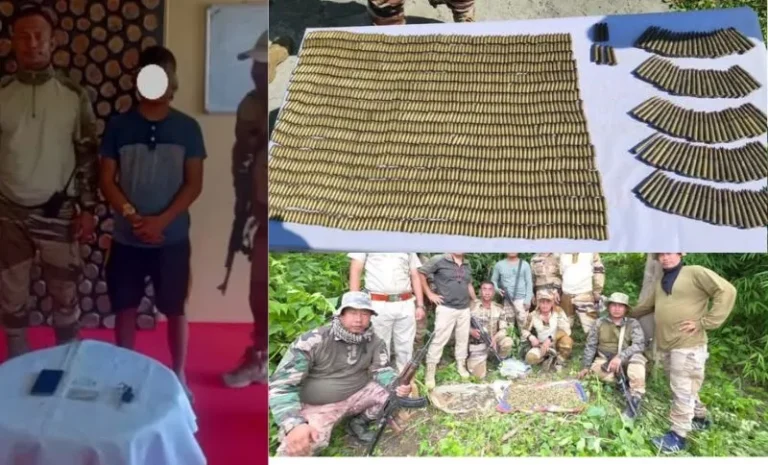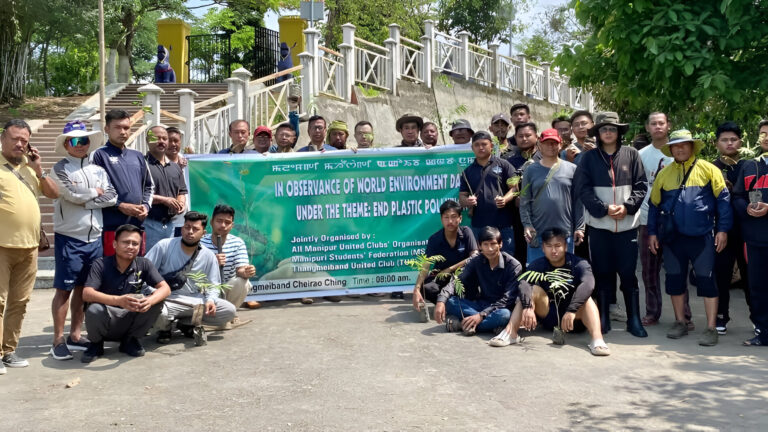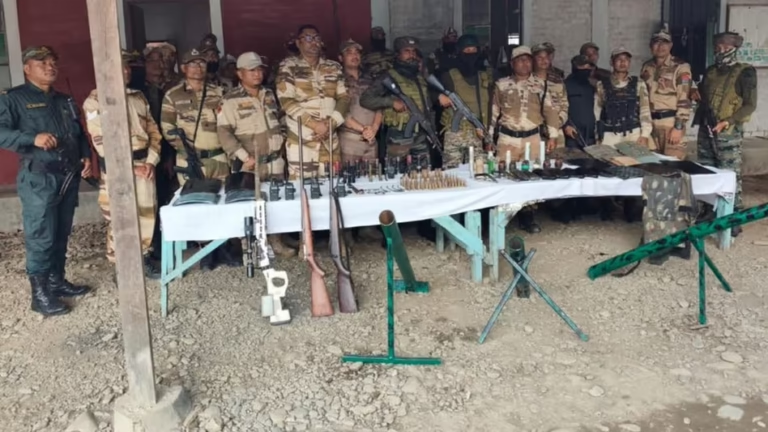Manipur: Alleged Smuggler Arrested with IMFL in Tengnoupal
Summary of the News Article
In a recent operation along the Indo-Myanmar border, security forces in Manipur’s Tengnoupal district apprehended 28-year-old Jamminthang Haokip for attempting to smuggle Indian Made Foreign Liquor (IMFL) into Myanmar. Authorities seized three boxes containing 72 half-litre bottles of IMFL from Haokip, a resident of Canan Veng, Moreh Ward No. VII. Following his arrest, both the suspect and the confiscated liquor were handed over to the Excise Department for further legal proceedings.
Unraveling the IMFL Smuggling Network in Manipur’s Tengnoupal District
Introduction
Manipur’s Tengnoupal district, nestled along the porous Indo-Myanmar border, has long been a hotspot for various cross-border activities, both legal and illicit. Among these, the smuggling of Indian Made Foreign Liquor (IMFL) has emerged as a persistent challenge for law enforcement agencies. The recent arrest of 28-year-old Jamminthang Haokip, caught attempting to ferry IMFL into Myanmar, underscores the complexities and ramifications of this underground trade.
The Anatomy of the Arrest
Acting on credible intelligence, a joint team comprising personnel from the Assam Rifles and the Tengnoupal district police intensified their surveillance operations at the Tengnoupal Check Post. Their vigilance paid off when they intercepted Haokip, a resident of Canan Veng, Moreh Ward No. VII. A thorough search led to the discovery of three boxes containing 72 half-litre plastic bottles of IMFL concealed within his belongings. Upon interrogation, Haokip confessed to his plan of smuggling the liquor into Myanmar, exploiting the region’s porous borders. NorthEast Now
Understanding the IMFL Smuggling Phenomenon
The smuggling of IMFL across the Indo-Myanmar border is not a novel concern. Several factors contribute to the persistence of this illicit trade:NorthEast Now
- Economic Disparities: The significant price difference of IMFL between India and Myanmar creates lucrative profit margins for smugglers.NorthEast Now
- Regulatory Restrictions: Stringent liquor laws in Manipur, including partial prohibition in certain areas, inadvertently fuel the demand for smuggled alcohol.
- Geographical Challenges: The extensive and often unmonitored stretches of the Indo-Myanmar border provide ample opportunities for clandestine crossings.NorthEast Now
The Socio-Economic Impact on Local Communities
The ramifications of IMFL smuggling extend beyond legal breaches, deeply affecting the socio-economic fabric of border communities:
- Public Health Concerns: The influx of unregulated alcohol poses significant health risks, including the potential consumption of adulterated or counterfeit products.NorthEast Now
- Erosion of Legal Businesses: Local businesses adhering to legal frameworks suffer due to unfair competition from the black market.
- Community Vulnerability: The allure of quick financial gains from smuggling can entangle vulnerable individuals, leading to a cycle of crime and dependency.
Law Enforcement’s Countermeasures
In response to the escalating smuggling activities, Manipur’s law enforcement agencies have adopted a multifaceted approach:
- Enhanced Surveillance: Regular patrols and surprise checks at strategic points along the border aim to deter and detect smuggling attempts.
- Community Engagement: Authorities are fostering partnerships with local communities to gather intelligence and raise awareness about the perils of smuggling.
- Inter-Agency Collaboration: Coordinated efforts between various security agencies ensure a more comprehensive and effective response to smuggling networks.
Challenges in Curbing IMFL Smuggling
Despite concerted efforts, several challenges impede the complete eradication of IMFL smuggling:NorthEast Now
- Resource Limitations: Adequate manpower and technological resources are essential for sustained surveillance, which often faces budgetary constraints.
- Corruption: Instances of collusion between smugglers and corrupt officials can undermine enforcement measures.
- Adaptive Smuggling Tactics: Smugglers continually evolve their methods, necessitating constant adaptation from law enforcement agencies.
The Road Ahead: Strategies for Sustainable Solutions
Addressing the IMFL smuggling issue requires a holistic strategy that encompasses:
- Policy Reforms: Re-evaluating existing liquor laws to balance regulation with realistic consumption patterns can reduce the incentive for smuggling.
- Economic Development: Investing in alternative livelihood opportunities for border communities can diminish the economic allure of smuggling.
- International Cooperation: Engaging in dialogues with Myanmar authorities can facilitate cross-border initiatives to tackle smuggling at its roots.
Conclusion
The arrest of Jamminthang Haokip serves as a microcosm of the broader challenge posed by IMFL smuggling in Manipur’s Tengnoupal district. While law enforcement agencies continue to make significant strides in curbing this illicit trade, a comprehensive approach involving policy reforms, community engagement, and international collaboration is imperative. Only through such concerted efforts can the socio-economic integrity of border regions be preserved, ensuring a safer and more prosperous future for their inhabitants
FAQs
- What led to the arrest of the alleged smuggler in Tengnoupal?
Local law enforcement intercepted an individual carrying a significant quantity of IMFL, which triggered a detailed investigation into his activities and connections to larger smuggling networks. - Why is IMFL significant in the context of smuggling in Manipur?
IMFL is a popular and profitable liquor that, when smuggled illegally, disrupts state revenue, fuels unregulated markets, and poses health risks due to the potential for adulteration. - How does Manipur’s geography contribute to smuggling activities?
The state’s rugged terrain and porous international borders provide smugglers with numerous opportunities to evade detection, making it a challenging area for law enforcement to secure fully. - What measures are being taken to combat smuggling in Manipur?
Authorities are employing enhanced surveillance, improved intelligence gathering, inter-agency collaboration, and community-based initiatives to crack down on smuggling networks and ensure long-term security. - How can addressing smuggling benefit the local community and economy?
Reducing smuggling can increase state revenue, enhance public safety, promote fair competition in legal markets, and contribute to better public health and social stability across the region.




